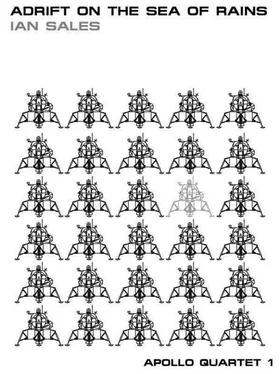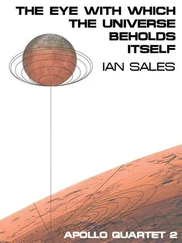Neubeck swears and jerks back his head. He twists to look up at Peterson. His forehead is cut, a line of red across his brow, like a thief’s brand. Stew drips from the end of his nose, is painted across one cheek.
Peterson steps back. His spacesuit will protect him—might as well hit a man in armour. Neubeck pulls himself up from the bench, but slows and comes to a halt.
Peterson moves to one side. Neubeck swears once again, and then leaves the wardroom.
In the now-empty room, the illusion Peterson is wearing a spacesuit abruptly vanishes. He wipes his hand against his leg, but the corruption smeared across his palm will need fiercer scrubbing. He wonders briefly what came over him, but it’s not something he wishes to think too hard about. He steps out into the corridor, slides the door to the wardroom shut, and continues on his way.
Peterson arrives at his cabin. He lies down on his bunk and throws an arm across his eyes. Against the black of his closed eyelids, he sees the lunar horizon, an undulating line of ash-grey snow, and above it the insubordinate Earth.
He was not so blasé he would fall asleep waiting for the launch, during the frequent delays, or even during the countdown itself, as some astronauts had done. Peterson still felt a keen anticipation, an eager expectancy of that inexorable push, of the rocket’s muted thunder, seeing the console before him vibrate until it blurred. It was a suspense tempered with apprehension, a foreknowledge of the slow build-up of Gs, the Earth’s reluctance to let him depart, pulling him back with such force his chair creaked and groaned beneath him as he suffered under his own increasing weight. And then that moment of vertigo, of abrupt revelatory lucidity, as the crushing acceleration suddenly ceased and he was thrown forward against his straps, only to snap back as if kicked in the chest, as the first stage dropped away and the S-II ignited. That one point in the trip to orbit, on every launch he had made, sparked the realisation he’d been sitting on 363 feet of explosive, equivalent to over half a kiloton of TNT, that he was being propelled into the air by nearly eight million pounds of thrust. Rocket travel was not safe—there had been remarkably few accidents, and there were countless back-up systems, but when something went wrong, it did so catastrophically. Now Peterson was in orbit and he no longer felt contact with the seat beneath him and his arms were floating above his seat’s arm-rests seemingly of their own accord. The CMP set about removing his spacesuit, and a pair of gloves and the polycarbonate bowl of an upturned helmet drifted past Peterson like one of those moments in a Tex Avery cartoon seconds before calamity strikes. On this taxi mission to the Moon, the CMP captained the spacecraft, since Peterson and Curtis, the third astronaut, were only along for the ride; nor would they be returning, at least not for six months—newly-promoted Colonel Vance Peterson, USAF, had been given command of Falcon Base, the USA’s only settlement on the Moon, located near the landing site of Apollo 15, the fourth mission to land on the lunar surface back in July 1971. The Soviets had nothing like Falcon Base, were unlikely to ever put a man on the Moon, though he had heard they’d come close once—but their N-1 booster, which was nearly as big and powerful as a Saturn V, had been plagued with problems and never flew. Of course, they had other problems now, or rather they had changed priorities and perhaps looked to other solutions to the problem a Moon landing might well have solved; and this time the Soviets were determined to succeed, and their brinksmanship had already spilled over into bloodshed. They’d been sending supersonic bombers over the North Pole for decades—Peterson himself had intercepted a number of them—and reconnaissance aircraft over US fleets, and sneaking nuclear submarines into US and European waters, but in space they were falling behind fast and they knew it, their technology, their engineering, wasn’t up to the job. After finally subduing Iraq and now in control of its oilfields, much to the world’s embarrassment, the Russians had manufactured an excuse in West Germany, and moved across the border in force; and Peterson had heard about it and wished he was back in TAC so he could go head to head against Soviet fighter pilots and prove who had the right stuff and who would be falling to Earth in flames. But it was all over in a week, hundreds left dead, black smoke over Hannover and Magdeburg, the burnt-out wrecks of main battle tanks in fields that once held wheat but they’d never be beaten into ploughshares. They’d dared not call it a war, though the border was back where it had been before, only this time drawn with the blood of servicemen, this time a barricade “they shall not pass”, and Peterson looking down on it from high above, so high that nations and manifest destinies blurred into a palimpsest of geography and history. But that was then and this was now, so he turned away from the spacecraft’s window and looked down his floating length, knowing that after Trans Lunar Insertion he’d spend two days in this sealed chamber, hurtling at near 25,000 miles per hour towards the Moon. He’d be kept busy, as this spacecraft needed constant monitoring and adjustment, via twenty-six panels of switches, dials, meters and circuit breakers, a console thirteen feet wide and three feet high. Peterson was eager to learn the routine of living on the Moon, to discover the demands it made on a person, to expand his horizons and stretch his envelope. In truth, he knew there’d be little enough for him to command—a few dozen small scientific experiments already in situ, the monitoring of lunar orbit for Soviet spacecraft, and keeping watch on Earth through the main telescope for objects in LEO. Falcon Base was a working installation, but its strategic workload was light and its tactical workload non-existent. As he divested himself of his own spacesuit, and stored it in the area beneath the bank of seats, Peterson grinned at his fellow travellers to the Moon and thought, by God, it was good to be here right now.
Peterson is outside again. He stands with Elbow Crater at his back, Falcon Base to his left, and gazes north across Mare Imbrium. The land falls away from him in a gentle slope, flat but for the dimples of craters. Ahead, one such depression is too deep for its bottom to be visible. Four miles away, the far slope of another crater, littered with rocks, forms the face of a low, flat hillock. Beyond that, though it resembles a wind-smoothed dune of grey sand, Mount Hadley stretches more than fifteen thousand feet into the lunar sky. The sun is up high to his right, throwing sharp black shadows. Peterson’s world is grey, but he can see streaks of pale brown, and even white, in amongst the footprints, tyre-tracks and disturbed regolith. He feels calm, soothed by the insistent whirr of the fans in his PLSS, by the comforting rubber and sweat stink of his A7LB. Peterson has come to love this desolate lunarscape, a black and white rendering of the high desert, busy with razor-edge detail but lifeless.
Once, Apollo 15’s Lunar Module sat alone on the plain, its silver face and golden skirt alien and bright; a strange visitor, bringing colour to this monochrome world. Though Peterson knows the LM’s descent stage is one of the many now scattered across Mare Imbrium, he is not sure which one it is. On past EVAs he has wandered among the spider-legged spacecraft, looking for a commemorative plaque. Progress has hidden Apollo 15’s LM, the achievement it represents, from casual view—the descent stages of the Augmented LMs are identical to it.
Peterson’s radio squawks.
Thirty seconds to evolution, says Scott.
Peterson turns to his left so he is facing the Earth. The thought of a mission to that blasted world, a lunar mission in reverse, but with the same technical requirements, occurs to him. He imagines wandering the streets of New York in his spacesuit. Assuming, of course, those streets still exist—the city was likely a target. Or perhaps a visit to the fields of Omaha and Nebraska. Except they too probably did not survive—the Soviets would have targetted the Minuteman and Titan silos buried beneath their soil. The American countryside, he suspects, looks little different to Mare Imbrium. He could be standing there now, he thinks.
Читать дальше











![Edward Ellis - Adrift on the Pacific - A Boys [sic] Story of the Sea and its Perils](/books/753342/edward-ellis-adrift-on-the-pacific-a-boys-sic-s-thumb.webp)
